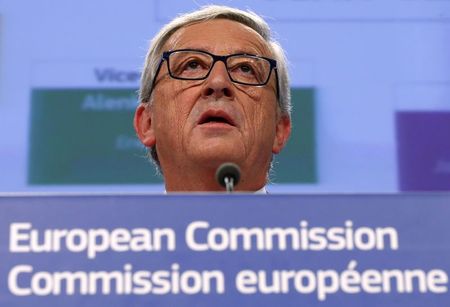By Barbara Lewis and Jan Strupczewski
BRUSSELS (Reuters) - The incoming head of the EU executive, Jean-Claude Juncker, is under pressure to drop one of his team and reshuffle nominees in a deal with parliamentary leaders to get his line-up confirmed in office, sources in the EU legislature said on Tuesday.
The prime casualty, several sources said, could be former Slovenian prime minister Alenka Bratusek, who would be replaced by a compatriot. The deal may also see Tibor Navracsics of Hungary given a smaller portfolio after a parliamentary committee voted to reject him over his civil rights record.
Bratusek failed to impress lawmakers at her confirmation hearing on Monday, seeming poorly prepared for her brief as vice president for energy union. Faced with a parliament keen to show its muscle, Bratusek, a centrist, is vulnerable as she effectively nominated herself while acting as caretaker after losing an election to the new centre-left government.
With Juncker keen to maintain the number of women on his 27-strong team, he may ask Slovenia to nominate centre-left EU lawmaker Tanja Fajon, who was on a short list of three originally proposed by Ljubljana. The Slovenian government said it was waiting for a decision from Juncker. An aide to Fajon said she had not been asked to join the Commission.
The deal, the sources said, could leave key economic posts assigned notably to French, British and Spanish nominees broadly unchanged - although all three have faced serious obstacles in the confirmation hearings and parliamentary leaders are expected to discuss their fates only later on Tuesday.
A spokeswoman for Juncker told a news briefing that "certain obstacles were overcome" in discussions with parliamentary leaders, including the blocking of Navracsics as commissioner for education, culture, youth and citizenship, and questions over the financial dealings of Spain's Miguel Arias Canete, who has been opposed by the Greens as energy and climate chief.
"Mr. Juncker's quite happy with the way things are going."
"COSMETIC DEAL"
The outlines of a deal angered the Greens, who had resisted what they saw as a Commission line-up produced by a "grand coalition" of the mainstream left and right. One Green lawmaker, Claude Turmes, said that Arias Canete and Navracsics would remain, with reduced responsibilities while the centre-left would gain a commissioner who would be female.
"Cosmetic deal between Shulz and Juncker," Turmes tweeted.
Earlier in the day, leaders of the main left and right groups in parliament, the centre-right EPP to which Juncker belongs and the centre-left S&D, met Juncker and parliamentary speaker Martin Schulz of the S&D to take stock of the confirmation process, a spokeswoman for Schulz said. Also present was Juncker's centre-left deputy Frans Timmermans.
Much remains unclear about how any compromise deal would work, with Juncker, the president-elect of the European Commission, keen to get his whole team confirmed en bloc by parliament on Oct. 22 as scheduled in order to take office on Nov. 1. Rivalries among parties, the EU institutions and member states all play a part in deciding the executive line-up.
Lawmakers plan to review the candidacies of Arias Canete as well as Britain's Jonathan Hill for financial services and France's Pierre Moscovici for economic affairs later on Tuesday.

Hill had to face an unusual second public hearing in committee on Tuesday, while Moscovici had to provide further written testimony by the same time.
(Additional reporting by Alastair Macdonald and Tom Koerkemeier; Writing by Alastair Macdonald; Editing by Giles Elgood)
